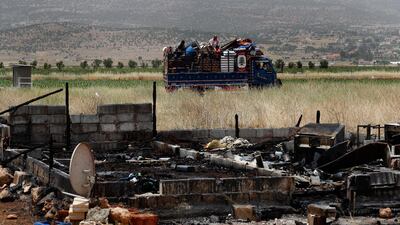Dozens of Syrian refugees on Sunday dismantled their tents, filled lorries with belongings and left a camp in which they lived for years in eastern Lebanon, after local authorities ordered them out following a brawl with local firefighters.
Lebanese officials said the decision to evacuate the camp was to prevent revenge attacks after residents of the town threatened to storm the camp.
A curfew on the estimated 600 Syrian refugees in Deir Al Ahmar was put in place for two days and police patrolled the area.
"This is to ensure their safety and to stop the bloodshed," said Jean Fakhry, a Lebanese municipality official in Deir Al Ahmar.
The evacuation of more than 90 tents reflects the growing trouble in Lebanon over taking in more than one million Syrian refugees since 2011.
A country of nearly five million, Lebanon's infrastructure and economy has been overwhelmed by the arrival of those fleeing the war in Syria.
Mostly impoverished and dispossessed, many settled in the country's east, living in squalid camps and struggling to work and survive in an area known for its harsh winters and extremely hot summers.
As Lebanon deals with an economic crisis, many politicians and groups called on Syrians to go home, saying the violence there was winding down.
In the scorching sun of the early afternoon, Syrian men, women and children pulled down cloth and carpets covering the wooden structures that served as their temporary homes.
They piled mattresses, pots and pans into lorries heading to a new location kilometres away.
Local officials say 600 lived in the camps but UN estimates said it was closer to 400 people.
It is at least the second time the refugees, most of them from Idlib province, had to pack their lives into boxes to find new, safer areas.
Samar Awad, 27, said the camp's residents were being sent to a new site with no electricity or water.
Ms Awad said it might be equally dangerous because their reputation as troublemakers would precede them.
"We have been living here for seven years," she said. "It has become like home, and more."
Ms Awad comes from Saraqeb, a town in Idlib, the last area controlled by the opposition to Syria's President Bashar Al Assad.
Seasonal farmers from Syria used to go to Lebanon even before the war. But many of them stayed after the violence, overwhelming the local communities.
Last week, a fire broke out on the hill overlooking the camp, sparking panic.
When firefighters arrived, residents pelted their vehicle with stones over what they said was the rescuers' late arrival. A brawl ensued and a firefighter was injured and tents were damaged.
The army arrived on the scene and arrested more than 30 Syrians. The camp residents fled and later, unknown assailants set three of the tents ablaze.
The strife led to the evacuation order and the lockdown on refugees in the area.
"There was local anger and revolt," Mr Fakhry said. "We decided they should not come back, to avoid another problem and bloodshed."
The UN refugee agency arrived at the scene on Sunday as the Syrians prepared to leave. The agency said all perpetrators should be prosecuted and an investigation was under way.
"A collective punishment of Syrian refugees in Lebanon will further escalate the situation," the UN agency for refugees said.
"All refugees in Lebanon should not be punished over one incident, outside the justice system."

